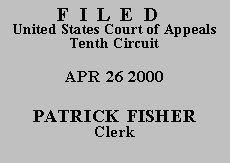

| UNITED STATES OF AMERICA, | No. 99-1357
(D.C. No. 99-CR-32) (D. Colo.) |
In February 1995, Sanchez-Patino, a Mexican citizen, was arrested for distributing heroin to an undercover officer. He was convicted in Colorado state court and sentenced to three years of probation for that offense. The federal Immigration and Naturalization Service ("INS") deported Sanchez-Patino to Mexico on March 31, 1995. There is no dispute that Sanchez-Patino's conviction was an "aggravated felony" within the meaning of the illegal reentry statute and the corresponding sentencing guideline. See 8 U.S.C. § 1101(a)(43)(B) (defining aggravated felony to include "illicit trafficking in a controlled substance"); U.S.S.G. § 2L1.2 commentary (n.1) (incorporating statutory definition "without regard to the date of the conviction of the aggravated felony).
On September 2, 1996, Sanchez-Patino was arrested attempting to reenter the United States at the New Mexico border. He was charged with illegal reentry following conviction of an aggravated felony, in violation of 8 U.S.C. § 1326(a) and (b)(2). Sanchez-Patino pled guilty to an information treating his prior conviction for an aggravated felony as a non-aggravated felony, under 8 U.S.C. § 1326(b)(1). The plea enabled Sanchez-Patino to receive a 4-level enhancement under U.S.S.G. § 2L1.2(b)(1)(B), instead of a 16-level enhancement under U.S.S.G. § 2L1.2(b)(1)(A). The plea agreement expressly stated that it was limited to the United States Attorney's Office for the District of New Mexico and did not bind any other federal, state, or local agencies or prosecuting authorities. (See Doc. 24, Attachment B, ¶ 14.) The federal district court in New Mexico accepted the plea agreement and sentenced Sanchez-Patino to 13 months' imprisonment. On August 12, 1997, Sanchez-Patino was released from federal custody and deported to Mexico.
On December 12, 1998, Sanchez-Patino was arrested by Denver police during a drug investigation. No drug charges were filed, but Denver authorities notified the INS about Sanchez-Patino's unlawful reentry into the United States. Sanchez-Patino was prosecuted and pled guilty to illegal reentry in violation of 8 U.S.C. § 1326. Sanchez-Patino filed a motion for downward departure, contending that under "equitable estoppel" principles, his prior conviction for sale of heroin should not be treated as an aggravated felony in computing his offense level. He based his argument on the fact that in the District of New Mexico prosecution, the U.S. District Court and the government treated that felony as if it were not an aggravated felony. (See Doc. 24 at 2-4.) The district court denied Sanchez-Patino's motion, stating that "[e]stoppel involves conduct which creates a reasonable expectation," and that Sanchez-Patino's argument was "not practical . . . because it gives to me as the sentencing judge in the first instance, an ability to bind all further judges because of alleged reliance on my lesser sentence." (ROA, Vol. 3, at 20.) Sanchez-Patino appeals, arguing that the district court should have found that equitable estoppel prevented it from treating his prior conviction as an aggravated felony.
The issue of whether there are grounds for applying estoppel is a legal one reviewed de novo on appeal. See United States v. Gutierrez-Gonzalez, 184 F.3d 1160, 1164 (10th Cir. 1999). However, because estoppel is an equitable concept invoked by the court in its discretion, a district court's rejection of an equitable estoppel argument is reviewed under the abuse of discretion standard. See Hoefler v. Babbitt, 139 F.3d 726, 727 (9th Cir. 1998).
Sanchez-Patino argues that he relied to his detriment on the New Mexico District Court's treatment of his prior conviction as a non-aggravated felony. He contends that had he known the conviction would be treated as an aggravated felony, thus significantly increasing the penalty for reentry, his conduct would have been different. We agree with the district court that Sanchez-Patino's argument lacks merit. The New Mexico plea agreement signed by Sanchez-Patino expressly stated that it did not bind any other federal, state, or local agencies or prosecuting authorities. Moreover, regardless of the penalty Sanchez-Patino thought he might receive, he knew that his reentry was illegal. See United States v. Perez-Torres, 15 F.3d 403, 407 (5th Cir. 1994) (finding that equitable estoppel was foreclosed to a defendant who knew re-entry was illegal and nevertheless willfully and purposely engaged in it). Contrary to the situation in which the government has committed affirmative misconduct, Sanchez-Patino's 1996 plea agreement stated it was not binding on any other prosecuting officials, making his reliance upon it unreasonable because the government promised him nothing in that regard. See Cunningham v. Diesslin, 92 F.3d 1054, 1059-60 (10th Cir. 1996) (finding that where a plea agreement did not promise mandatory parole, estoppel would not bar a defendant from serving a full sentence); Perez-Torres, 15 F.3d at 407 (noting that a sentence enhancement was not estopped when the defendant "had reasonable opportunity for knowledge of the potential penalty").
We AFFIRM the conviction and sentence of the district court.
The mandate shall issue forthwith.
ENTERED FOR THE COURT
David M. Ebel
Circuit Judge
*.After examining appellant's brief and the appellate record, this panel has determined unanimously that oral argument would not materially assist the determination of this appeal. See Fed. R. App. P. 34(a)(2) and 10th Cir. R. 34.1(G). The case is therefore ordered submitted without oral argument. This Order and Judgment is not binding precedent, except under the doctrines of law of the case, res judicata, and collateral estoppel. The court generally disfavors the citation of orders and judgments; nevertheless, an order and judgment may be cited under the terms and conditions of 10th Cir. R. 36.3.